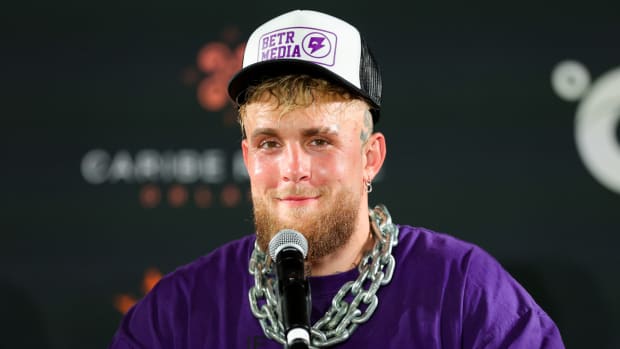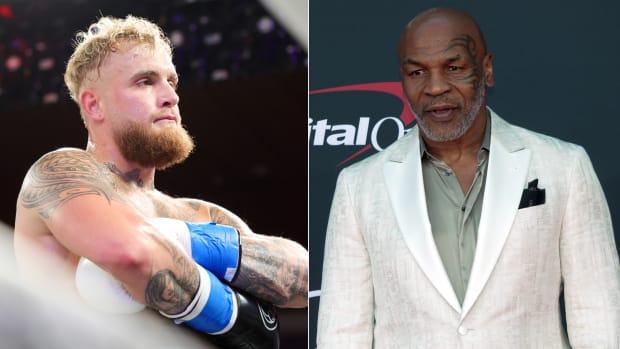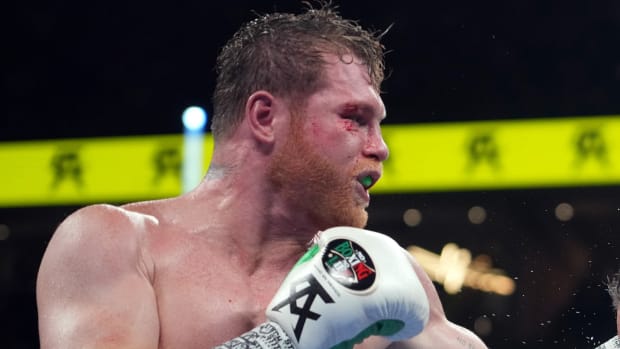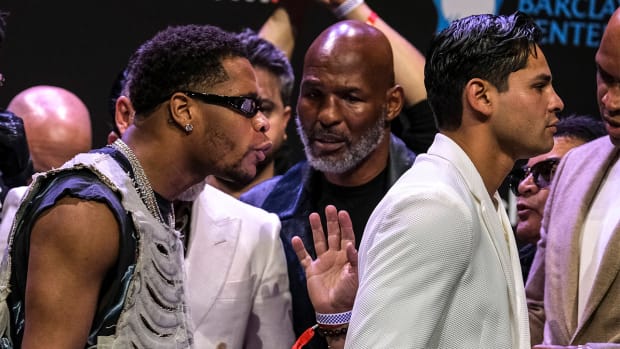'In My Heart, I Want to Continue to Fight': Manny Pacquiao Isn't Ready to Retire, but the End May Be Near
LAS VEGAS — They came to T-Mobile Arena on Saturday, the friends and family and associates of Manny Pacquiao. His fans. The boxing aficionados. The celebrities. A full 2,000 people received tickets from the boxer. A few hundred managed to meet with him this week inside his suite at the MGM Grand. A couple dozen found their way to a maze of hallways beneath the stands, navigated to the dressing rooms, pushed past one unmarked door and ran into another.
Below a red sign that announced RESTROOMS, a single sheet of white paper was taped to the brown wood. In all caps and blue type, it marked the inner sanctuary, with two words—MANNY PACQUIAO—that were laden with significance, like a portal to The End. Everyone who advanced inside understood the landscape and the stakes. Not for this particular bout, against welterweight champion Yordenis Ugás. But for this particular boxer, at this particular moment in time.
The assembled knew that an eight-division world champion hoped to summon more age-defying magic in order to launch a presidential campaign in the Philippines. But they also wondered, because of things like physics and birthday candles, whether they were gathering as they had for decades—only, now, for the last time.
More than three hours before the opening bell sounded, the line at the box office snaked halfway down the street. One person even dressed like Pacquiao, right down to the boxing trunks. As he shadowboxed, the dominant chant that echoed all Saturday began. Man-ny! Man-ny! Man-ny!
The folks who started arriving in that dressing room tried to remember those kinds of details, just in case, you never know. They knew that Pacquiao spent most of his Saturday like any other Saturday, that he woke up, held Bible study, ate breakfast and met with everyone who stopped by. Whatever they wanted from him—a picture, an autograph, a wink—he obliged. Then he took a nap. Before he left, he even signed several business contracts.
And yet, this was not any other Saturday. This was, potentially, The End.
Longtime team members like Buboy Fernandez wait for Pacquiao’s arrival. They hang up the bright red robe he will wear into the ring. They fiddle with the water bottles stacked on a folding table, arranging and rearranging. They even stretch out, hours before they will shout instructions while sitting down.
The clock ticks past 6 p.m., as the broadcast begins on the television in the dressing room. It starts with the backdrop: the mega-fight with Errol Spence Jr. that had been canceled, after Spence suffered a torn retina in his left eye; the welterweight champion, Ugás, who had been scheduled for the same card, only for his own opponent to suffer an injury; then, the perfect, last-second pairing. Ugás, after all, held the WBA belt that had been taken from Pacquiao due to inactivity. Ugás took the fight on 11 days’ notice, calling it the “most important” bout of his life. In that fearlessness, Pacquiao looked at Ugás—an Olympic bronze medalist and Cuban defector who never shied away from top competition—and saw a younger version of … himself.
The minutes tick away. Every time the door to the dressing room opens, heads turn. Pacquiao rode a bus to the arena, then walked through the hallway maze with a smile spread wide across his face, right hand waving to the cameras. The activity picks up. Someone brings food in. Someone else carries a case; its contents undetermined; someone else, a garment bag with the blue suit Pacquiao will don in a few hours. One person’s job is to hold the national flag of the Philippines, and he takes that job quite seriously, carrying it everywhere, practicing his waves, trying out two hands vs. one and wiping down the handle.
Pacquiao enters the dressing room at 6:30 flanked by his wife, Jinkee, and their children. He huddles with Justin Fortune, his strength-and-conditioning coach. Then, almost immediately, he lies down on a massage table, where a therapist goes to work on his calves. This strikes most longtime Pacquiao observers as unusual; no one can recall him receiving similar treatment in the hours before a fight before. But most inside the dressing room see this as a concession to age, not a sign of it. They say Pacquiao has incorporated massage treatment throughout this camp, for his legs specifically, and that the work had effectively ended the cramping issues that have cropped up at various points throughout his career.
The boxer hops off the table and pantomimes a series of basketball jumpers. He seems loose. He winks. A lot. He laughs, even more. He stands near Sean Gibbons, his manager, as Gibbons posits that camp “had clicked” over the previous two weeks. The crowds that came to watch Pacquiao had swelled from 50 to over 400, as helicopters circled overhead. Gibbons says that Gilberto Mendoza, the WBA president, had even paid Pacquiao a visit to try and ease any lingering tension from the belt fiasco. “No worries,” Pacquiao told him.
Gibbons wonders the same thing many wonder: could Pacquiao defeat Ugás as something of a prelude, another victory before some sort of ultimate send-off, maybe against Spence. But Gibbons doesn’t want to look too far ahead, either. He remembers what Pacquiao had told their team: “Don’t look past anything.”
At 6:56, officials ask that all non-corner personnel clear the room. Some version of this happens roughly 37 times over the next two hours. Sometimes, it works; or, more accurately, sometimes it works better than others. Fortune leans in close to Pacquiao. “You ready?” he asks. The boxer nods.
If this is The End, this is what it looks like. He hugs his wife … hugs his kids … asks that the flag bearer be allowed to remain inside. The front of his red shirt says Man Of Destiny, only the words are stacked, so that it says “Manny,” too.
In the next dressing room over, Victor Ortiz is warming up for an undercard bout. His thudding punches serve as a reminder of just how unusual Pacquiao’s career is. Ortiz was once a prime welterweight contender in his own right, but that feels like a million years ago. Pacquiao was a level—or three—above Ortiz and remains that way. After losing to Floyd Mayweather Jr. in 2015, Pacquiao went 5-1, and his thunderous victory over undefeated Keith Thurman in 2019 served as a reminder that he could beat elite boxers and Father Time on the same night.
At 7:45, yet another cell phone is shoved in Pacquiao’s face. This happens roughly 25 times in the hours before the bout. Only this time, over FaceTime, it’s Jack Ma, the billionaire co-founder of the Alibaba Group. Pacquiao pauses from getting his hands wrapped.
“Hello, my brother,” he says. “Thank you, thank you.”
The anticipation builds. One longtime confidant wears a T-shirt that says, “Pacquiao vs. Everybody,” and it reads like a misnomer because the boxer is gifting the assembled with memories, multi-tasking all the way until his ring walk. He checks his phone. Sprays his hands with water. Bounces on those massaged calves. Swings his hips in hula-hoop-like circles. Bangs his fists on his own abs. Celebrates a knockout from Mark Magsayo, another Filipino boxer who Pacquiao inspired who now wears a belt around his waist.
7:49: The referee tells Pacquiao his most important job is to protect himself at all times.
7:51: The room clears.
7:58: The room fills again.
Pacquiao ties and unties his shoes. He puts on his shorts, changes shirts—the new one says “God’s Champion”—and has gloves shoved onto his fists. Finally, it’s time; if not, The End, then more steps in that direction.
Roach is back in the dressing room, after working two other corners for two other fights on the card. By this point, only a handful of Pacquiao’s closest confidants remain. Roach gives Pacquiao one final instruction—to wait for Ugás to throw a straight right and come over the top of it with his left. “Catch him when he lunges,” Roach says. But there’s something else about that moment that stands out. It’s the fighter and the trainer, after two decades now something closer to father and son. At this moment, about to walk to the ring to face an opponent with superb technical proficiency, having been given less than two weeks to prepare for his tricky style, they’re both … smiling.
Adrien Broner stops in and wishes Pacquiao good luck. He heads to a couch in the back, kneels down and prays. An official tells the group to put their masks on. “Me also?” Pacquiao cracks.
“Alright, let’s go fellas!” someone yells
And off they walk, to a chorus of “let’s go!” and “let’s f----- go!” and “it’s not over yet.” The group heads away from the quiet, strolling into an arena jolted by electricity. It’s packed, not a seat open. “Eye of the Tiger” blares over the loudspeakers. And everyone is chanting: Man-ny! Man-ny!
It feels like … the perfect end?
Well, Ugás has something to say about that. He stalks toward Pacquiao at the opening bell, his frame noticeably larger. Pacquiao briefly pins him in the corner. The crowd leaps to its collective feet and roars.
By the end of the second round, though, the theme of the fight becomes clearer. Ugás, in style and in age, presents a problem for Pacquiao. His double jab is effective and opens up a bruise that swells under Pacquiao’s right eye. The crowd continues trying, cheering, chanting, as if willing Pacquiao forward. But he looks like a 42-year-old champion facing a game opponent. He’s not as fast as the Pacquiao that will live forever in the minds of boxing fans across the world. His punches aren’t as precise.
A boxer who once delivered spectacular knockouts entered this bout with only one stoppage victory in his last 16 bouts. That’s a factor against Ugás, too, and one that Ugás exacerbates with excellent defensive maneuvering. Thomas “The Hitman” Hearns watches all this unfold from ringside. He knows that power doesn’t last forever. Nor do Hall of Fame careers.
Pacquiao and Ugás go back and forth, both men trading blows but neither doing extensive damage to the other. By the time the final bell rings, the fight is close. Most boxing experts posting on social media believe that Ugás won, by a close margin, and the judges agree, scoring the bout unanimously for the Cuban champion (115-113, 116-112, 116-112).
The crowd boos but their reaction seems halfhearted, because they now must face the cold and inevitable truth: if this isn’t Manny Pacquiao’s last fight, maybe it should be.
Pacquiao retreats to both the dressing room and an uncertain future. He finds Roach and wraps his trainer in a bear hug. His people shower him with a standing ovation.
He’s gracious in defeat. He says that his legs were cramping, which limited his movement, giving additional context to that pre-fight massage. There’s that mouse under his right eye. Bruises cover his left cheek and the forehead space above his left eyebrow. His lip is fattened. His right eye is turned bright red. He’s now 18—5—2 in world title fights, has done everything a boxer can do. And while the defeat likely hurts his chances to become president of the Philippines next May, he has a lot of life ahead of him.
Consider all of that and there’s only one logical conclusion: there doesn’t seem to be any reason for him to continue fighting. Except the most important one: he wants to. Pacquiao admits as much at the post-fight news conference. He tells the writers there to cover him that “we’re not young anymore.”
“In my heart, I want to continue to fight,” he says. “But I also have to consider my body.”
For now, his boxing future remains in doubt. But he should listen to himself. If this is indeed The End, Pacquiao finished a career unlike any other with a night like many others. What made it special, what the assembled will remember, are those hours in the dressing room, when the ecosystem that is Manny Pacquiao continued onward, and it wasn’t about Ugás or legacy or pound-for-pound rankings. It was about Fortune and Gibbons and Buboy and Roach. And, of course, the champion who tethered all of them together, for as long as he possibly could.
More Boxing Coverage:
• Fury-Wilder Fight Rescheduled for October After COVID-19 Outbreak
• Muhammad Ali’s Grandson Wins in Pro Boxing Debut With First-Round TKO
• Inside Manny Pacquiao's Uncommon Relationship With Longtime Trainer Freddie Roach





